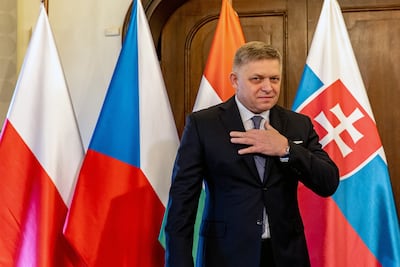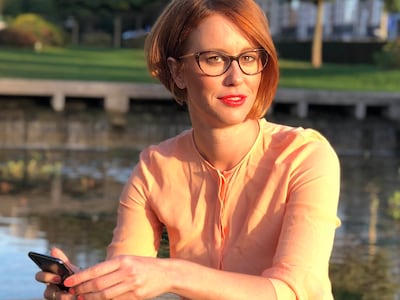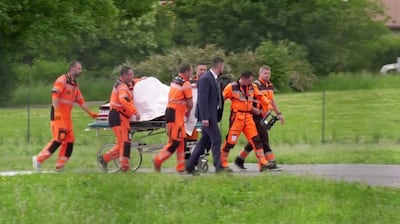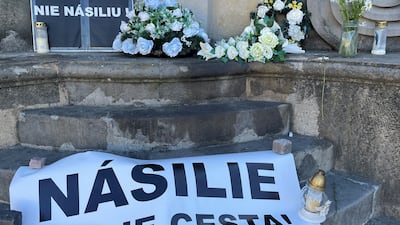Slovakian politician Lucia Klestincova was on a phone call discussing the rise in hate speech across Europe when she first learnt of the assassination attempt on Prime Minister Robert Fico.
Ms Klestincova, who is next month due to stand in the European elections for her opposition Volt Slovakia party, on Thursday joined pleas for “respect and tolerance”, after the attack in which Mr Fico was shot five times in the stomach while meeting supporters.
Flowers and banners have been placed at the scene of Wednesday's attack in Handlova, with Mr Fico, 59, in hospital after having a major operation.
A man has been charged with attempting to assassinate the populist leader, in what police said was a politically motivated lone-wolf attack.
One minister called the incident the “darkest day of Slovak democracy”. Ms Klestincova told The National that it was "time for humanity across the political spectrum to calm emotions" and denounce all forms of hatred and violence.
"It was an attack on democracy," she said. "I was on a call to another political candidate from our pan-European movement when it happened. We were discussing reforms proposed in our programme, including against hate speech.
"As it was an attack on the leader of the democratically elected government, it was an attack on democracy itself. Whether we agree or disagree – and I more frequently disagree with the Prime Minister – this moment calls for unity.
"It calls for leaders across the political spectrum to denounce all forms of hatred and violence against politicians and civilians. It calls out for humanity."
The assassination attempt shocked the nation and reverberated across the continent, weeks before European elections.
Slovakia's President Zuzana Caputova said it was time to curb the vitriol that has characterised political debate. “Hate speech and rhetoric full of hate – which we witness across society – leads to hateful acts,” she said. “Please, let’s stop that.”
Senior government and parliamentary figures have been quick to blame a sour political mood in Slovakia for the attack.
Mr Fico's Russia-friendly stance and repeated attacks on the EU, migrants and independent media have sparked comparisons to Hungary’s nationalist Prime Minister Viktor Orban. His supporters say opposition parties have stirred up unrest in Slovakia, an EU and Nato country.

Police warned that some people were using social media to praise the attack and “spread hate” and said users would be punished if they crossed the line.
“Respect and tolerance are all you need. Those are two words that everyone should follow when communicating,” Slovak police said. “It should also be a standard in everyday life, where respect, decency, dignity and other virtues of daily life belong.”
The attack on Mr Fico came shortly after a bitter Slovak presidential election and weeks before a European Parliament vote, in which nationalists could make gains across the continent.
Germany has faced a spate of political attacks in recent weeks in which an EU election candidate was badly injured and a former Berlin mayor struck on the head.

Ms Klestincova told The National she is concerned for the safety of candidates after the attack and hopes security is strengthened.
"This brutal assassination attempt against Prime Minister Robert Fico has been a shock to the country, where gun violence is still rare," she said.
"I hope security will be increased but especially the communication culture in politics worldwide. I am working to change things and to help birth a new culture of politics in Europe.
"We at Volt stand for respect and inclusion, listening and sustainability as opposed to the old politics that have fuelled hate and divisiveness. "Multiple party leaders were wildly irresponsible in politicising the attack for political gain immediately after the news broke.
"Slovaks are tired of politics of polarisation and hate. They wish for stability and competence. They want leaders to propose robust solutions to the complex challenges we face domestically, across Europe and beyond."
Assassination attempt on Slovakia's Prime Minister - in pictures
The shooting in Slovakia caused a sharp rise in tension in Germany, with Vice Chancellor Robert Habeck referring to the far-right Alternative for Germany party as he warned that “deeds follow from words”.
Accused of playing with fire in its fierce anti-government comments, the party accused Mr Habeck of exploiting Mr Fico’s shooting to “vilify the opposition”.
In the UK, concerns for the safety of politicians have influenced parliamentary debates over the Israel-Gaza war, with some protesters staging rallies outside the private homes of MPs.
The Jo Cox Foundation, named after a Labour MP who was murdered in 2016, said it was shocked by the attack on Mr Fico and it condemned all violence against elected representatives.
“I think we react particularly to murders of politicians because they represent not only themselves but certain ideas, and we also assume that they are protected,” Poland’s Foreign Minister Radek Sikorski told BBC Radio 4.
“People sometimes take their ideas to extremes and act on them, which is why we punish hate speech,” said Mr Sikorski, who said he once had an unsettling experience when a man approached him with a syringe.
“When you go on hustings or make speeches, you pay attention to what you’re trying to say. You don’t pay attention to your environment.”

Unrest in Slovakia led to the end of Mr Fico’s second term as leader in 2018, when the murder of an investigative journalist led to mass protests against corruption.
Mr Fico staged a comeback by winning elections last September, returning to power on a platform of halting arms deliveries to Ukraine, increasing social spending and challenging EU policy on migration and climate change.
Since returning to power, he has vowed he will not introduce an EU migration deal that calls for states to share the burden of managing asylum seekers.
Although he has recently moderated his tone on Ukraine, Russia’s former president Dmitry Medvedev praised Mr Fico on Thursday as one of few politicians in Europe with a “reasonable” stance towards Moscow.
The Slovakian leader also plans to abolish an anti-corruption prosecutor and make changes to the country's independent media, leading to protests and growing concerns that Slovakia will move farther from democracy.
Allies of Mr Fico – who is known for tirades against journalists – say opponents and the Slovakian media have gone overboard in their criticism, fuelling further division. Condemnation of the attack came from Mr Fico's allies and adversaries abroad.
Russian President Vladimir Putin sent a message to Ms Caputova expressing his support and wishing the Mr Fico a fast and full recovery.
“This atrocious crime cannot be justified,” Mr Putin said. “I know Robert Fico as a courageous and strong-willed person. I truly hope these personal qualities will help him overcome this harsh situation.”
Ukrainian President Volodymyr Zelenskyy also denounced the violence against a neighbouring country’s head of government. “Every effort should be made to ensure that violence does not become the norm in any country, form or sphere,” he said.











